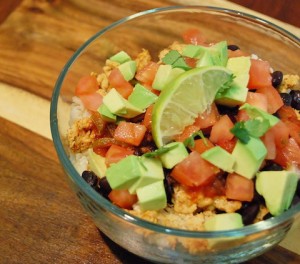 This recipe is not only naturally gluten-free with the plethora of fresh produce, lean protein, and the gluten-free brown rice, but it makes a perfect meal to serve buffet-style so everyone can add or omit ingredients to create the burrito bowl they like best.
This recipe is not only naturally gluten-free with the plethora of fresh produce, lean protein, and the gluten-free brown rice, but it makes a perfect meal to serve buffet-style so everyone can add or omit ingredients to create the burrito bowl they like best.
Ingredients:
- 1 c. organic brown rice (measured dry)
- 1 organic lime
- ¼ c. organic cilantro, finely chopped
- 1 lb. organic, 99% lean ground turkey
- 1 Tbs. chili powder
- 1 Tbs. cumin
- 1 Tbs. garlic powder
- 1 Tbs. lime juice
- 1 cup organic black beans
- 4 cups organic romaine lettuce or spinach
- ½ c. organic salsa
- 2 small, organic tomatoes
- 1 organic avocado
Directions:
- Cook the organic brown rice according to package directions (just the water – don’t add salt or fat). When all the water is absorbed, stir in the juice and zest of the lime and the finely chopped cilantro. Set aside. (Tip: if making ahead of time for a party, you can refrigerate the rice at this stage, and reheat later.)
- In a nonstick skillet over medium-high heat, cook the pound of lean ground turkey. Add the chili powder, cumin, garlic powder, and 1 tablespoon of juice from another lime. When the turkey is crumbled and cooked through, set aside. (Tip: this can also be refrigerated at this point if making ahead.)
- When you’re ready to serve, prepare your toppings. Rinse and drain the black beans, chop the lettuce or spinach, chop the tomatoes, dice the avocado, and slice the olives if not already sliced.
- To assemble burrito bowls, divide everything into four bowls. Start with 1 c. of lettuce or spinach, then ¼ of the rice mixture, ¼ of the turkey mixture, ¼ c. black beans, 2 tablespoons organic salsa, half a chopped organic tomato, and ¼ of the diced avocado.
This makes four servings (and any leftovers make fantastic, healthy, packed lunches!). Feel free to add other vegetables, too, like roasted onions, peppers, mushrooms, or zucchini.
Nutrition
Per serving: 404 calories, 10.2 g fat, 1.8 g saturated fat, 55 mg cholesterol, 197.4 mg sodium, 45.7 g carbohydrates, 11 g fiber, 2.8 g sugars, 34.4 g protein
Brown Rice
Brown rice is a good source of fiber, healthy fatty acids, manganese, selenium, magnesium, and tryptophan. Due to the strong manganese content, which aids in energy production cycles in the body, brown rice can aid in energy production and conversion in the body. It also offers antioxidant protection, lowers cholesterol, can aid in colon cancer protection, and reduced risk of cardiovascular disease and metabolic syndrome.
Lime
Limes are a good source of vitamin C for low calories. Their phytonutrients are loaded with antioxidant and antibiotic effects.
Turkey
Turkey contains tryptophan, protein, selenium, vitamin B3, vitamin B6, phosphorus, choline, and zinc. As a white meat, increasing your intake of turkey and other poultry products (while decreasing red meat consumption) will lessen the risk of heart disease, type 2 diabetes, and colon cancer.
Cilantro
Cilantro has been medicinally used as a cleansing agent in some cultures. It has been used to effectively remove heavy metals and other toxic agents from the body. The oil in the cilantro plant creates a positive effect on the digestive tract, as it aids human production of digestive enzymes, acids, and juices. Other health properties include anti-inflammatory benefits, anti-bacterial properties, lowering of LDL cholesterol/ increasing HDL cholesterol (the “good” cholesterol), can reduce gas and nausea, can contain immune system-boosting properties, and many more.
Chili Powder
Chili powder can relieve achy joints, as capsaicin, found in chili peppers, has an anti-inflammatory effect. This can help ease arthritic swelling and pain.
Cumin
Cumin is a good source of iron, manganese, magnesium, and calcium. These little seeds are good for digestion, iron for energy, immune function, and cancer prevention. Tip: it’s a great spice to use in Indian, Middle Eastern, or Mexican-flavored cuisine!
Garlic
Garlic is a good source of manganese, vitamin B6, vitamin C, selenium, calcium, tryptophan, phosphorus, vitamin B12, and copper. It offers cardiovascular benefits, anti-inflammatory benefits, antibacterial and antiviral benefits, and cancer prevention. Also, recent studies are suggesting garlic may even improve the absorption of iron.
Black Beans
Black beans contain molybdenum, folate, fiber, tryptophan, manganese, magnesium, protein, vitamin B1, phosphorus, and iron. They have digestive tract benefits, blood sugar-reducing benefits, cardiovascular benefits, and are a good source of antioxidants. Additionally, they can help with anti-inflammatory benefits.
Romaine
Romaine lettuce packs quite a nutritional punch for very little calories. It contains vitamin A, vitamin K, vitamin C, folate, fiber, molybdenum, manganese, potassium, iron, vitamin B1, omega-3 fats, vitamin B2, vitamin B6, magnesium, tryptophan, calcium, phosphorus, and copper. All of these nutrients can lead to increased overall wellness, and a younger, healthier heart.
Tomatoes
Tomatoes contain vitamin C, vitamin A, vitamin K, potassium, molybdenum, manganese, fiber, vitamin B6, folate, copper, vitamin B3, magnesium, vitamin E, vitamin B1, phosphorus, protein, tryptophan, choline, and iron. It’s also plentiful in numerous phytonutrients, including lycopene. They offer cardiovascular support, support bone health, and offer anti-cancer benefits. Also, while these studies aren’t as numerous as conclusive, there is recent evidence suggesting tomatoes may reduce risk of some neurological disorders (like Alzheimer’s disease) and obesity.
Avocado
Avocado is a strong source of fiber, vitamin K, folate, vitamin C, vitamin B5, potassium, and vitamin B6. Although high in fat, avocados are technically a fruit (sometimes called an alligator pear). In addition to cardiovascular health benefits, avocados also offer anti-inflammatory benefits, namely from phytosterols, antioxidants, and omega-3 fatty acids.
